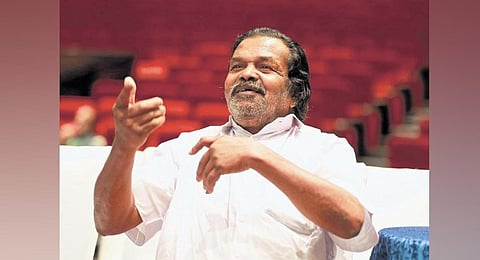A tribal farmer’s crusade to preserve native paddy species
KOCHI: He has been leading a campaign for preserving indigenous rice varieties and traditional farming practices. The Padma Shri award and the National Plant Genome Saviour Award have made him popular, but the celebrity status has little impact on his routine. Known as the guardian of native paddy species and India’s living paddy gene bank, Cheruvayal Raman, the tribal farmer belonging to the Kurichiya tribe, continues reminding society of the need to preserve age-old practices of sustainable farming.
At the 16th Agricultural Science Congress, scientists, policymakers and farmers from across the country were jostling to click a selfie with the son of the soil. While the scientists were delivering speeches on adopting modern farming methods and genetically modified crops, Raman used the opportunity to remind them about the need to return to traditional practices.
“The genetically modified rice varieties may help increase farm output, but it will destroy the body’s immunity. Seeds that are produced through natural pollination will make us healthy and immune to diseases. Now, even children are suffering from diseases. This wrong farming policy will turn us into an ailing population,” Raman told TNIE.
“I had stopped using fertilizers and pesticides around four decades ago. I stopped using fertilizers and pesticides after realising their role in the degradation of the ecosystem. I am not against introducing scientific methods in farming but we should be judicious while adopting new farming practices. Though the yield from traditional varieties can be less, it is healthy and builds immunity. We should prefer health over profit,” he said.
Raman has preserved around 60 varieties of indigenous paddy seeds including Thondi, Chennellu,Veliyan, Kanali, Chembakam, Chettuveliyan, Kalladiyaran, Channalthondi, Jeerakasala, Gandhakashala and Kayama. Some of these species have medicinal values, some are noted for their aroma and a few varieties are resilient to extreme weather conditions like flood and drought.
Raman gifts the seeds to farmers free of cost, on condition that they should return the same quantity of quality seeds from their first crop. “I don’t want money, but I want people to preserve these seeds for future generations. Padma Shri has brought recognition and people from across the country visit my village to learn about my farming. They visit me out of curiosity and are not serious about agriculture. However, I am happy that my endeavour has helped create awareness of the need to preserve our traditional practices,” he said.
A school dropout, Raman urges scientists to initiate steps to preserve traditional rice varieties. They should preserve these seeds and encourage farmers to use them. Raman has inherited around 40 varieties of rice species and sustainable farming practice from his tribal ancestors. The rest of the seeds were collected from farmers in Wayanad. The district had around 160 varieties of paddy species, but a majority of them were lost as the agriculture department started promoting high-yield varieties.

